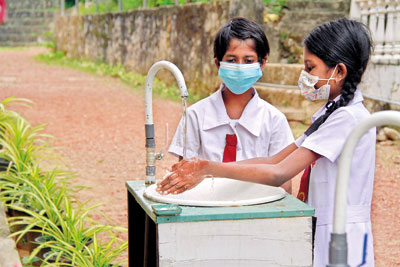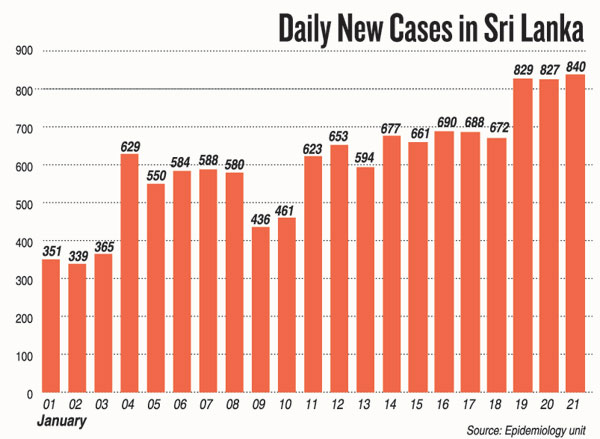News
Severe headache could signal Omicron
Two variants of concern – Omicron and Delta – and the experience at ground-level are what is placed on the table by a doctor who has been treating patients affected by COVID-19 since Sri Lanka had its first case in January 2020.
The number of people being affected by COVID-19 is rising rapidly but no increasing trend in hospitalization due to severe disease is being seen, said Consultant Physician Dr. Eranga Narangoda now attached to the Homagama Base Hospital. He was earlier at the National Institute of Infectious Diseases (NIID), Angoda.

Dr. Eranga Narangoda
On the current trend of infections, he says that there is asymptomatic (without symptoms) and also symptomatic disease, whereas earlier there was a lot of symptomatic disease during the Delta spread. This difference could also be because of vaccination. Even if patients do come with severe disease, the oxygen saturation issue settles in 3-4 days.
Dr. Narangoda then looks at the symptoms resulting from an infection of the two variants.
n With Omicron, there seems to be not much fever in a majority of infections, unlike Delta. But some have headaches, often bad ones, which last 3-4 days. Some infected by Omicron, only have a headache.
n Omicron is also showing more respiratory symptoms such as a stuffy or runny nose, sore throat and mild cough.
If a person gets to know that he/she has got exposed to someone who is infected, this Physician’s advice is:
n Usually, the incubation period (the number of days between when a person is infected with the virus and when symptoms would be seen) is about 48 hours, which means that those who have got exposed may manifest symptoms in 48 hours. Generally, symptoms seem to appear on Day 4 or 5 after initial exposure. By Day 10 after exposure, a person is unlikely to develop symptoms.
n Even if asymptomatic, the person who has got exposed to an infected person should isolate for 14 days, counting the days from the time of exposure.
n If asymptomatic, there is no need to get yourself tested, unless symptoms develop or unless you are part of essential services such as healthcare workers. Then you need to get tested on Day 10, either with an RT-PCR or a Rapid Antigen Test (RAT). All others who are asymptomatic can resume work on Day 14 without testing.
n If symptoms develop, there is a need to isolate yourself immediately, with or without exposure. After Day 14, counting from the first day of the manifestation of symptoms, you can resume your day-to-day life and also go back to work.
Referring to what is meant by “significant exposure”, Dr. Narangoda says it is when a person has been exposed to a COVID-19 positive person and been in close proximity, within a metre distance; either one has not been wearing a face-mask and the exposure has lasted for more than 15 minutes.

Be conscious of hand hygiene
When asked about reports of ‘positive’ people turning negative soon after, he said that this could occur due to contamination if a large number of samples are undergoing RT-PCR testing.
If just one among many is positive, that cannot be a false result but if several samples are positive, some of them could be false results due to contamination by the actual positive samples.
Another scenario is that a person who tests positive can show a negative result 2-3 days later, as the infecting virus may have got cleared with the body fighting it off.
Adhere strictly to preventive measures
| |
| Safeguard the immuno-suppressed, plea to family members Many people are showing mild symptoms in the current wave but not being affected by hypoxia (a state in which a person’s body tissue does not get adequate oxygen), says Dr. Eranga Narangoda. He reiterates that the severe COVID-19 cases they are seeing are those who are not fully vaccinated (who have not got their primary two-doses of a vaccine followed by a booster) and those with diseases such as kidney ailments and cancer who are immuno-suppressed. “This is why we are appealing to everyone to safeguard those who are immuno-suppressed. In a family, even if you are young, think of others who may be immuno-suppressed. If you disregard the preventive measures, you may get the infection, have mild disease and recover even without treatment. But the same cannot be said about your immuno-suppressed loved ones. They will get infected, have complications and even die,” he said, stressing that he sees such patients and is “helpless”. Whatever the healthcare workers do, such patients still die.
| |
| No proven benefits from ivermectin “No mortality benefits have been found. This means that no benefits of ivermectin preventing COVID-19 deaths have been established. It may help with reducing symptoms in mildly symptomatic people but even without ivermectin that happens through proper management,” he said. He added that the Health Ministry treatment guidelines do not recommend ivermectin in the management of COVID-19 patients.
|
The best way to say that you found the home of your dreams is by finding it on Hitad.lk. We have listings for apartments for sale or rent in Sri Lanka, no matter what locale you're looking for! Whether you live in Colombo, Galle, Kandy, Matara, Jaffna and more - we've got them all!

